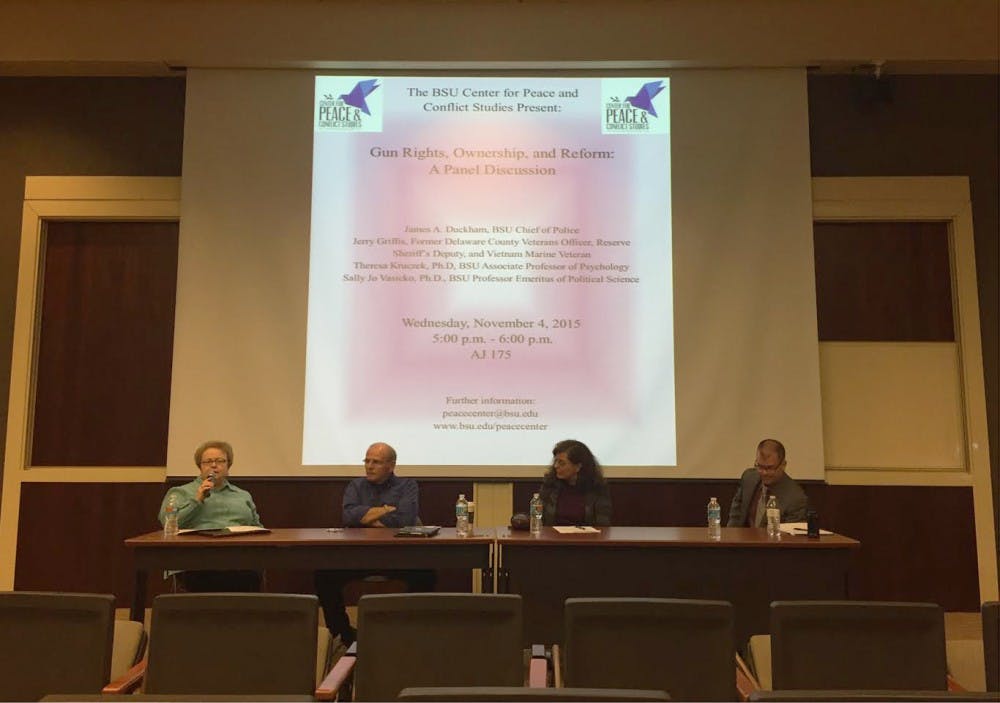The government and society should look at gun ownership reform, rather than overarching gun control, suggested a panel on the discussion of gun rights.
The BSU Center for Peace & Conflict Studies held its second discussion series of the year on Nov. 4, “Gun Rights, Ownership, and Reform: A Panel Discussion.”
Theresa Kruczek, an associate professor of psychology, said people recoil because of the word “control.”
“No one wants to be controlled,” Kruczek said. “‘Gun ownership laws’ is a better way of saying it. We need to have laws about gun ownership and safety and policies.”
The discussion started with a video made by Mark Carman, a producer and former police officer. In the video, Carman discusses responsible gun ownership and laws.
Jim Duckham, the chief of the University Police Department, stressed that while he is not a gun enthusiast and is not passionate about gun ownership, he does agree with Carman that it is an issue that needs to be managed.
“I’m certainly for regulation, background checks and reasonableness,” Duckham said. “Reasonable people should be allowed to own guns. My job is to make sure people who shouldn’t have them don’t.”
All of the panelists agreed that gun ownership rules are a difficult subject to talk about, mostly because they see no right or wrong answers.
“We’re all saying ‘something’ has to be done to stop the massacres,” said Sally Jo Vasicko, a professor emeritus of political science. “What is that ‘something,’ and how are we going to enforce it?”
Having a basic knowledge of how to use a gun is a must, the panelists agreed, along with better enforcement of permits and rules. But, Jerry Griffis, a former Delaware County veterans officer, reserve sheriff's deputy and Vietnam Marine veteran, also said it is not that simple.
“The bad guys don’t care about permits, safety and rules,” Griffis said. “There’s always going to be idiots with guns.”
Another key issue regarding gun ownership is looking at why people want to own guns. The panelists mostly discussed self defense.
Kruczek cited a study, which found the number of people dying in mass shootings was smaller than those who have died in individual shootings.
“We have an issue right now. People have the perception you need to protect yourself,” Kruczek said. “Part of the issue is the perception that we are not safe. That is not the case.”
Some audience members vouched for being able to carry concealed weapons on campus, but the panelists shot this down.
“I don’t want guns on campus. I don’t think it’s a good thing,” Duckham said. “I’ve heard the arguments, and you’re just not gonna convince me.”
Kruczek cited biological reasons against guns on campus.
“No offense to those under 22, but your frontal lobes aren’t fully developed,” she said. “College students can make bad choices. It concerns me to put a gun in the hand of someone in a developmental stage at risk to not make the best choices.”
There were no clear answers to a solution, but the panelists believed education and familiarization with guns to be a start in moving the conversation forward.
The distinction between “control” and “ownership” regulation comes into play when purchasing a firearm. According to a USA Today article, people looking for a gun can buy one in an actual gun store, but can also go to a pawn shop, a gun show, look on the Internet or even buy one off of a friend. There are no background checks required in purchases between private citizens or in certain cases at gun shows.
So while people may not want to be “controlled,” the panelists agreed that changes are needed to fix the lax rules in gun purchases.
“We have a culture of violence,” Kruczek said. “Other countries don’t have restrictions on guns and still don’t have the same level of violence we do. ... The reality is very complicated from [a] sociocultural perspective.”
Related:
In 2016, Indiana Rep. Jim Lucas will introduce a bill to relax concealed carry laws, again.





